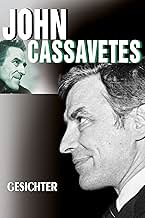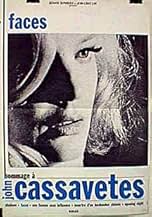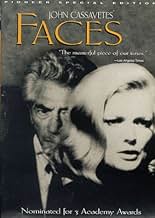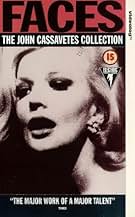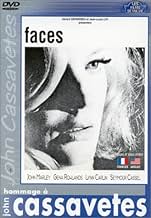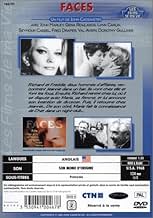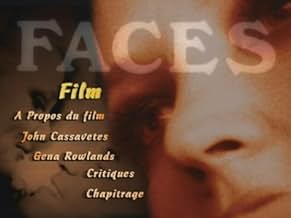Un hombre de mediana edad deja a su esposa por una mujer más joven. Poco después, su exesposa también comienza una relación con una pareja más joven. La película narra las dificultades a las... Leer todoUn hombre de mediana edad deja a su esposa por una mujer más joven. Poco después, su exesposa también comienza una relación con una pareja más joven. La película narra las dificultades a las que se enfrentan para encontrar el amor.Un hombre de mediana edad deja a su esposa por una mujer más joven. Poco después, su exesposa también comienza una relación con una pareja más joven. La película narra las dificultades a las que se enfrentan para encontrar el amor.
- Dirección
- Guionista
- Elenco
- Nominado a 3 premios Óscar
- 5 premios ganados y 9 nominaciones en total
- Comedian
- (as George Dunne)
- Dirección
- Guionista
- Todo el elenco y el equipo
- Producción, taquilla y más en IMDbPro
Opiniones destacadas
It is a deep exploration of manhood in America, of the power games that men play with women, and of the other kinds of games women victimize themselves with. Deeper than Citizen Kane, more abrasive than Magnolia or American Beauty, Faces turns the camera on the ordinary, everyday ways men and women treat each other. It wants to get under your skin, and if you allow it to, without giving up or shutting your mind to it, it will profoundly enlighten you.
I also want to highly recommend a stunning book about Cassavetes that makes a nice companion piece to a viewing of the film. Ray Carney's Cassavetes on Cassavetes book (or his web site devoted to Cassavetes) has almost 100 pages about the making of this film. Both throw more light on how Cassavetes got the amazingly intimate and exposed performances he did.
But trust me, this film can change your life. It is one of the greatest works of art in all of film. And the resistance it meets with is proof of it
This film, I would say is another one of those indie films (sort of foreign-filmmaking- esque) from how it is much ado about NOTHING. I love these films. They are like a breath of fresh air. That, and they always seem so personal. I wonder if it was actually scripted or if it was improvised like most Cassavetes projects.
The only work I have seen of Mr. John Cassavetes was his depute film, Shadows, which was mainly all improve, or so he says in his interviews. I take a strong liking to these films because of how slow they are, yet SO INVITING; so UN-American, if you will. - People have said that Cassavetes brought the indie film movement to the states. So far I have not been proved wrong so far. His films, such as Faces, are all so unique and timeless. Like literally, I believe this movie will be studied until THE END OF TIME.
I like seeing people celebrating. It is nice. Gives one the feeling of calmness; like nothing extreme is happening so we don't have to waste any time stressing about it. Does that make sense?
Our main protagonist, Richard Forst (played by John Marley), is a (so called) businessman who has an affair with a much younger woman. Little does he know that his wife has some plans of her own.. You can really tell what kind of man Robert is when he says:
"I'm just a mild success in a dull profession, and I want to start over again. And I've got a bad kidney!"
This just shows what kind of person he is as he says it to the younger girl, Jeannie (played by the beautiful Gene Rowlands).
I really like the acting and love the struggles and conflict that this husband and wife go through. Both are trying to find happiness in so many ways, but is only making it worse for themselves. .
-- Michael Mendez
Basically, except for the poor dubbing that makes literally MOST of the dialogue in the film incomprehensible, I can't say there's anything about any individual sequences in the film that I disliked. HOWEVER, what I did have a problem with is this: the vanguard style of filmmaking, the characters, the situations they are in, the dialogue (if you want to call it that): does it all really come together to SAY anything? I didn't come away with any kind of an interesting or coherent message from the film. Which is fine if the scenes flow nicely together, but they really don't. Each scene as an entity unto itself is wonderful, but their juxtaposition together gets especially tiresome. I mean, for roughly 80% of the film, ALL of the characters onscreen are inebriated. Now, this makes it extremely difficult to get to know the characters beyond their buffoonish drunken altar egoes. Maybe, that was the point. I don't know. What I do know is that Cassavetes stubbornly refuses to reveal to us anything that even approximately resembles, plot, forward motion, or even... any kind of... an event... a happening until the last twenty minutes of the film when some interesting stuff finally happens. And this definitely alienates most audiences. Do you want to know why this movie has such a high rating? Because the people that didn't like it left after twenty-forty minutes. I know in the theater that I saw it in (a student film organization that watches intellectually stimulating independent fare weekly with warm response), the crowd of twenty people had been reduced by the end of the film to me, the president of the club (who was reading), and one other guy (whom I have a suspicion, fell asleep during at least part of the film) in the theater. EVERYBODY else got frustrated. Draw your own conclusions.
The film has moments of great pain because miniature struggles are so real and they tend to be vocalizations of a person's deeper fears in social interactions and in the structure of life. The film has scenes of furious drama because characters will experience blind unleashing of their ids as middle-aged people. Faces also delivers highly during moments of happiness and fun because, the situation's comfort level gracefully allowing, the characters will show the fieriest, grandiose, extroverted parts of themselves.
The movie's message, ironically, is not about the inner self and the unleashing of it but about the naiveté with which people carry out their normal married lives and don't care to face their flaws and problems and, though they gradually strip their personalities down bare throughout interactions, they continue not knowing themselves or each other. Faces is now among my favorite films of all time and places John Cassavetes on a pedestal as an idol of mine. The movie is a supreme demonstration of powerhouse acting, wherein each performance can be cherished by the performer with a feeling of ownership. There is a bit of real actor in each character played, and that can be seen in each and every powerhouse scene in a row.
¿Sabías que…?
- TriviaWhile filming a part on Bob Hope Presents the Chrysler Theatre (1963), John Cassavetes saw Steven Spielberg lurking around the set, as he was then in the habit of doing. Cassavetes approached Spielberg and asked what he wanted to be. When Spielberg replied he wanted to be a director, Cassavetes allowed the young man to direct him for the day. He later invited Spielberg to work on this film with Spielberg serving as an uncredited production assistant on Rostros (1968) for two weeks.
- Citas
Maria Forst: There's a Bergman film in the neighborhood.
Richard Forst: I don't feel like getting depressed tonight.
- ConexionesFeatured in Cinéastes de notre temps: John Cassavetes (1969)
- Bandas sonorasLove Is All You Really Want
Written by Jack Ackerman
Selecciones populares
- How long is Faces?Con tecnología de Alexa
Detalles
Taquilla
- Presupuesto
- USD 275,000 (estimado)
- Total a nivel mundial
- USD 7,236
- Tiempo de ejecución2 horas 10 minutos
- Color
- Mezcla de sonido
- Relación de aspecto
- 1.66 : 1
Contribuir a esta página



